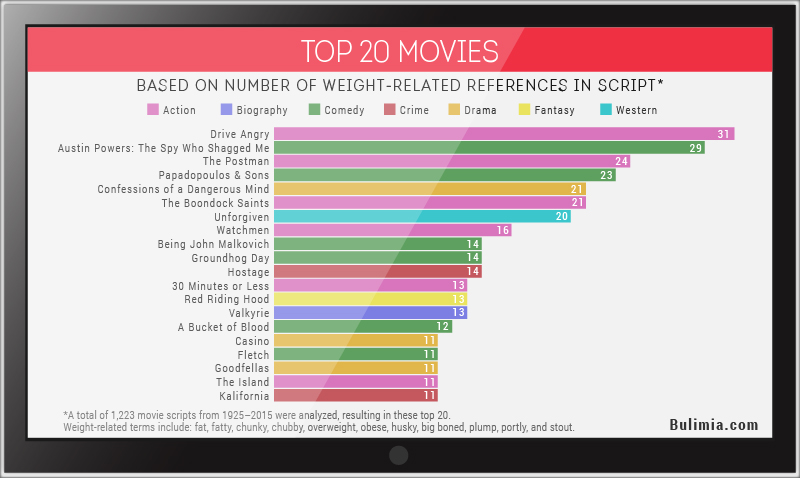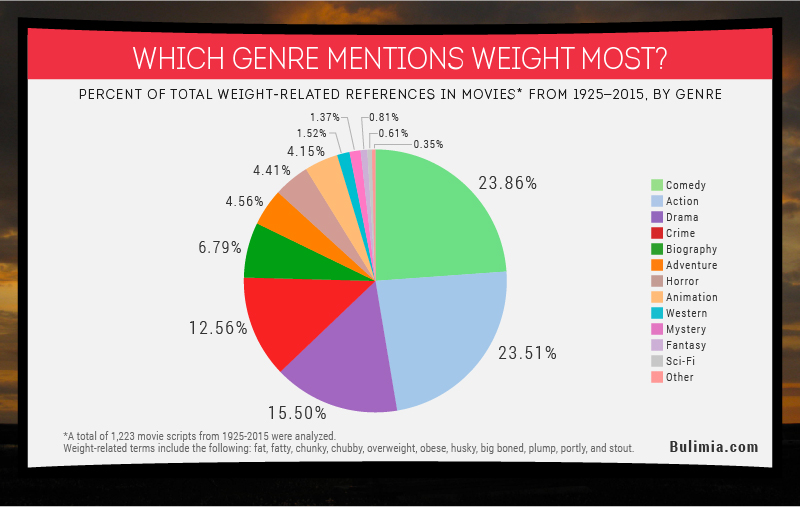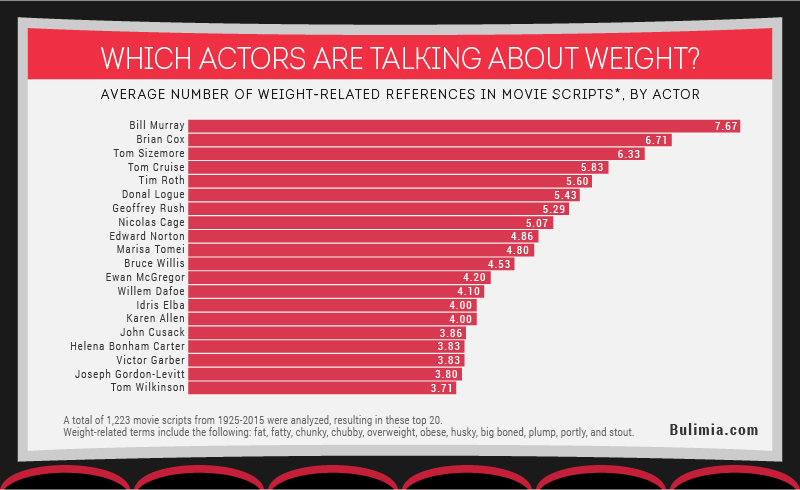So how is this emotion-fraught topic often handled on the big screen? We examined the roles weight plays in popular films: Which movies – and movie genres – mention weight most? Which actors most frequently appear in these films or play characters with weight-related names (think “Fat Lou” and “Chubby Man”). The results are surprising – and our script analysis doesn’t even capture sight gags or other unspoken references to weight, so it’s likely the total count is even higher. Read on to get the skinny.

When it comes to weight-related remarks, 2011’s “Drive Angry” takes the cake: Characters mentioned weight a whopping 31 times during the 104-minute-long film. One character goes by “Fat Lou” and the term “fat” is used in a derogatory manner. In second place comes “Austin Powers: The Spy Who Shagged Me” (1996) with 29 mentions: “I can’t stop eating. I eat because I’m unhappy, and I’m unhappy because I eat. It’s a vicious cycle,” says the character dubbed “Fat Bastard.” “The Postman,” which debuted in 1997, comes in third with 24 mentions of weight-related terms.

Next, we zoomed out from specific films to explore which genre most frequently tackles the subject of weight. Comedies come first (with 23.86% of weight-related remarks), and action films are a close second (holding 23.51% of mentions of weight). Dramas, crime films, and biographies trail.
Why do people think being overweight is funny? When asked why comedies tackle such serious subjects, comic Sarah Silverman sums it up to Time magazine: “That’s the reason people become funny is to overcome pain,” she says. “The most basic is the fat kid making the fat joke first.”
It may be a common reality, and indeed we draw humor from it regularly, but it’s fundamentally tragic – not comical – that anyone would feel compelled to joke about their weight to dodge public scrutiny and derision. In many of these instances, people are clearly masking pain – pain that in some cases may spur development of disordered eating, potentially leading to conditions such as anorexia. Others may turn to compulsive exercise, and other purge behaviors associated with bulimia.
A struggle with body image can ultimately have severe repercussions, and many people in these situations can benefit from some form of counseling. If you’re concerned you may already be feeling the impact of a distorted body image or you have developed signs of an eating disorder, visit Bulimia.com today to learn more about recovery options.

Some movie actors seem to get typecast in certain roles: the sidekick, the straight man, the comic relief. So which actors end up with lines that mention weight the most? Bill Murray comes in first, with an average of nearly eight weight-related mentions per movie. (“There is a very fat pair of pants hanging on the flagpole this morning,” Murray says as Tripper in 1979’s “Meatballs.”)
Brian Cox ranks second with nearly seven mentions, Tom Sizemore comes in third with just over six, and Tom Cruise comes in fourth with nearly six (“ Six billion people on the planet, you’re getting bent out of shape cause of one fat guy,” Cruise says as X Vincent in 2004’s “Collateral.”)

Quotes aside, sometimes characters’ very names make reference to their weight – whether lighthearted or not. In “Drive Angry,” which debuted in 2011, Jack McGee plays Fat Lou – the slightly lecherous guy who runs Fat Lou’s Roadside Diner. The memorable “Austin Powers: The Spy Who Shagged Me” pokes continual fun at “Fat Bastard,” a morbidly obese henchman portrayed by Mike Meyers. (“I want my baby back baby back baby back baby back baby back ribs,” the character famously said.)
The script for 1997’s “The Postman” (1997) features a character referred to as “Chubby Sentry,” played by Andy Garrison. And 2012’s “Papadopoulos & Sons” includes a man called “Fat Laki,” played by Jimmy Roussounis. What are some other weight-related character nicknames? Fatty, Fat Thug, Chubby Man, and Fat Knight, among others.
Explore the interactive topic cluster above for a visual representation of weight-related mentions in movies. Larger, darker bubbles represent movies with more weight-related terms mentioned. Hover over any bubble to see the movie name, the year it was released, and the IMDB rating.
Overweight Main Characters Looking beyond our script analysis of weight-related terms, the film industry has a long and varied history of producing movies that feature overweight characters. Some movies portray weight sensitively; others make a mockery of the subject; but few politely disregard the subject of weight altogether – perhaps mirroring our collective real-life inability to do so.
Some actors have enough natural talent that weight all but becomes a moot point. Boisterous SNL veteran Chris Farley took center stage in movies from “Tommy Boy” (1995) and “Black Sheep” (1996). Two plus-sized women stole the show in 2011’s “Bridesmaids”: Melissa McCarthy as the groom’s sister Megan and Rebel Wilson as awful roommate Brynn. Wilson was a fan favorite again in 2015’s “Pitch Perfect 2” as Fat Amy.
The film version of the hit musical “Hairspray,” which debuted in 2007, chronicles the life of Tracy Turnblad (played by Nikki Blonsky) as she follows her dream of becoming a dancer. “Precious” (2009) chronicles the struggles of an abused overweight teen trying to turn her life around. 2011’s “Shallow Hal” – featuring Gwyneth Paltrow in a fat suit playing a 300-pound woman – offers a surprisingly sensitive commentary on inner beauty.
Living Large
Whether on-screen or in real life, celebrities’ views on body image are as varied as anyone’s. In a conversation about Marilyn Monroe, actress and model Elizabeth Hurley once famously told Allure magazine, “I’d kill myself if I was that fat.” (Hurley did, however, also remark that Monroe “looked fabulous.”) On the flip side, plus-size actress Melissa McCarthy has a philosophical take: “My weight? It is what it is. You could get hit by a bus tomorrow. It’s about being content. And sometimes other priorities win.”
Regardless of gender, weight, and body image, one thing is clear: The big screen simply serves to magnify the weighty conversations that occur in everyday life. Some of us may feel cheated if a markedly underweight or overweight character doesn’t, at some point during the film, make reference to their body. We might even find the film unrealistic if the topic is ignored altogether. Our collective obsession with weight is hard to escape, and it frequently translates to the movies we watch – featured perhaps at levels that we wouldn’t see in our (semi) polite society.
When it comes to down to it, what matters most is that people are happy, healthy, and comfortable in their own skin. Some people, dealing with a seemingly never-ending barrage of critical scrutiny – whether real or imagined – have difficulty reaching this state, and they may end up suffering from compulsive eating behaviors or take other unhealthy steps in an attempt to measure up to what they perceive as a more ideal body type. Help is available to these individuals. Visit our site at www.bulimia.com for more information about eating disorders and issues concerning body image, see how treatment programs can help.
Methodology
We analyzed 1,223 film scripts for mentions of the following terms: fat, fatty, chunky, big boned (combined with big-boned), chubby, husky, obese, overweight, plump, portly, and stout. Of those 1,223 film scripts, 707 contained at least one of the above terms. We also included non-dialogue mentions of these terms, such as characters being named “fat man.”
Resources
- http://www.imdb.com/title/tt1502404/http://www.imdb.com/title/tt0145660/
- http://time.com/4075048/sarah-silverman-i-smile-back-interview/
- http://www.imdb.com/title/tt0079540/quotes
- https://www.washingtonpost.com/posteverything/wp/2014/09/05/womens-greatest-threat-isnt-misogyny-its-counting-calories/http://time.com/3909192/melissa-mccarthy-spy/
- http://www.imdb.com/title/tt0369339/quotes
- http://www.imsdb.com/scripts/Postman,-The.html